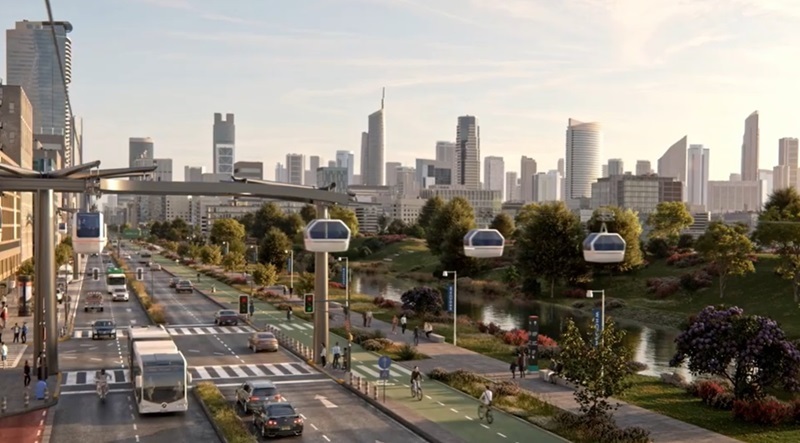Whoosh around town: Transport pilot features gondola-like pods
RNZ
11 September 2024, 9:50 PM
 Whoosh head Dr Chris Allington beside a prototype Whoosh vehicle in Christchurch. Photo: RNZ / Anna Sargent
Whoosh head Dr Chris Allington beside a prototype Whoosh vehicle in Christchurch. Photo: RNZ / Anna SargentGondola-like pods hanging under rails and over roads, taxiing travellers around city centres, might sound futuristic, but a Christchurch company says it can beat urban traffic congestion with its Whoosh transport project.
Construction is set to start on a pilot in Queenstown next year.
Woosh chief executive Dr Chris Allington - from the engineering firm Holmes Solutions - said it had taken five years to develop, and had largely been kept under wraps until now.
Using an app, riders would hail or pre-book an autonomous electric vehicle that navigated its own way across an elevated guideway of fixed cables.
"The whole system works on demand, so you can hop on your app and call a vehicle, when you walk to the station it will be waiting for you, hop into it, it will take you directly to where you want to go without stopping along the way," Allington said.
The cabins would fit five people and the service would be cheaper to build than roads or light rail, he said.

A computer simulation of how Whoosh would look in a city. Image: RNZ
"For most standard networks that we're installing, it's around about $5 million dollars per kilometre and if you compare that to say road construction in the urban space that's around about $20 million per kilometre, and I think when they were looking at light rail it was north of $100 million per kilometre. So it's quite a cost-effective solution."
Allington said Whoosh had been funded by a private equity firm in North America.
Construction on the world's first Whoosh pilot at Remarkables Park in Queenstown is set to start next year, with hopes it would be up and running by 2027.
Allington said this was being funded by a combination of local investors.
He hoped it would show other cities the technology was worth bringing in.
"The system has been designed to fit nicely in the urban environment so we can fit within that tight urban constraint. The cities and the environments we're building in, they're really tight so there's not much room to build more roads and there's definitely no more room on the roads for more cars so you have to think differently. So elevating up above it was the way to go with lightweight infrastructure."
AIlington said there was already a lot of overseas interest in Whoosh.
An early backer was former Google transportation executive Jeral Poskey, who left his former employer and founded Swyft Cities to become a global licensing partner for Whoosh.
He said he had been involved in brokering deals with 18 locations around the world, mostly in the US.
"About half are cities and half are private real estate owners- where there is a real estate developer, or a ski resort, or it could be an amusement park.
"They all have a common thread that they are caught up in congestion, they are looking for something new, and they know that nothing else out there is going to solve their problem."
Public Transport Users Association national co-ordinator Jon Reeves had his doubts about Whoosh.
"When I see these sort of things, I am always reminded of the famous Simpsons episode with monorail where they had the monorail that goes nowhere. And it does remind me of that. I'm glad they've got a lot of hype about it, it's probably the perfect thing for a ski resort, or a city with a resort, maybe Rotorua, but for a mass transport system it doesn't cut the mustard."
He thought if the gondola cars were dangling above roads, the company should expect pushback from people who owned properties along the route.
Reeves said he was sceptical because he had seen the likes of Whoosh before.
"I think the gondola type or monorail ideas come up every five to 10 years, I've probably seen this about four or five times now. As a public transport method to move large scale numbers to get people out of cars, I don't think this is the right one. It may be cheaper, but it isn't better."
NEWS
WHAT'S ON GUIDE




